新概念英语第二册lesson 18 He often does this! (共31张PPT)
文档属性
| 名称 | 新概念英语第二册lesson 18 He often does this! (共31张PPT) | 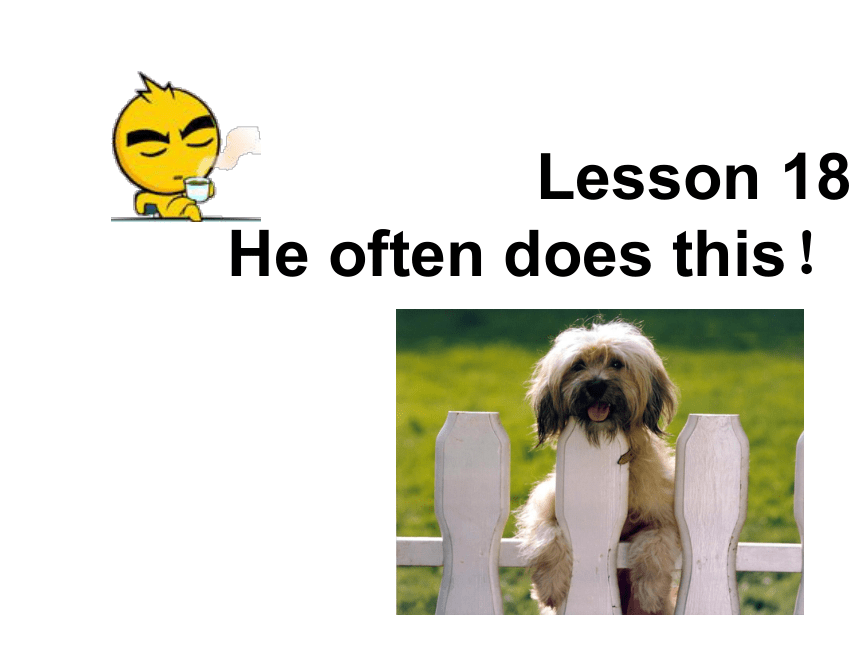 | |
| 格式 | ppt | ||
| 文件大小 | 2.0MB | ||
| 资源类型 | 教案 | ||
| 版本资源 | 新概念英语 | ||
| 科目 | 英语 | ||
| 更新时间 | 2023-10-06 19:27:14 | ||
图片预览

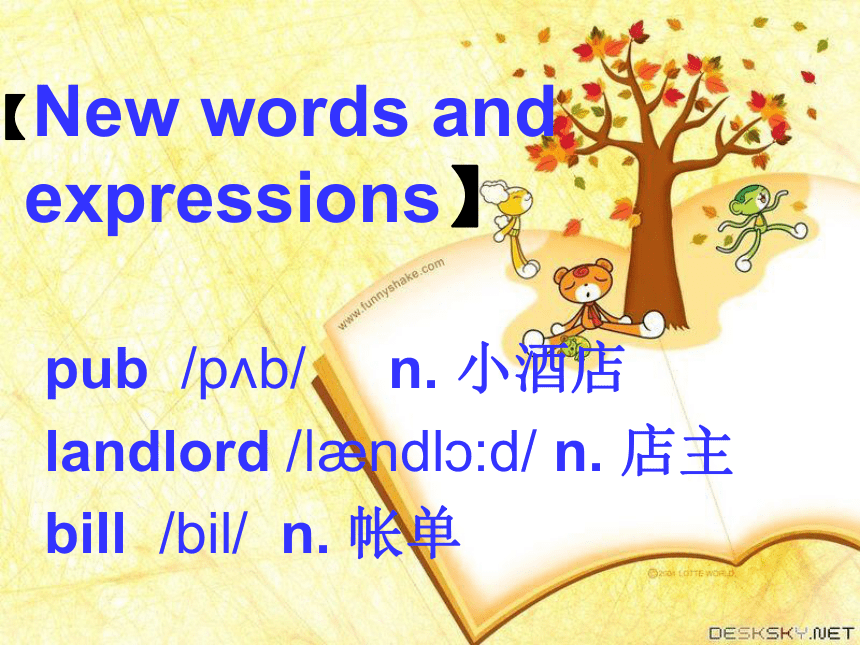
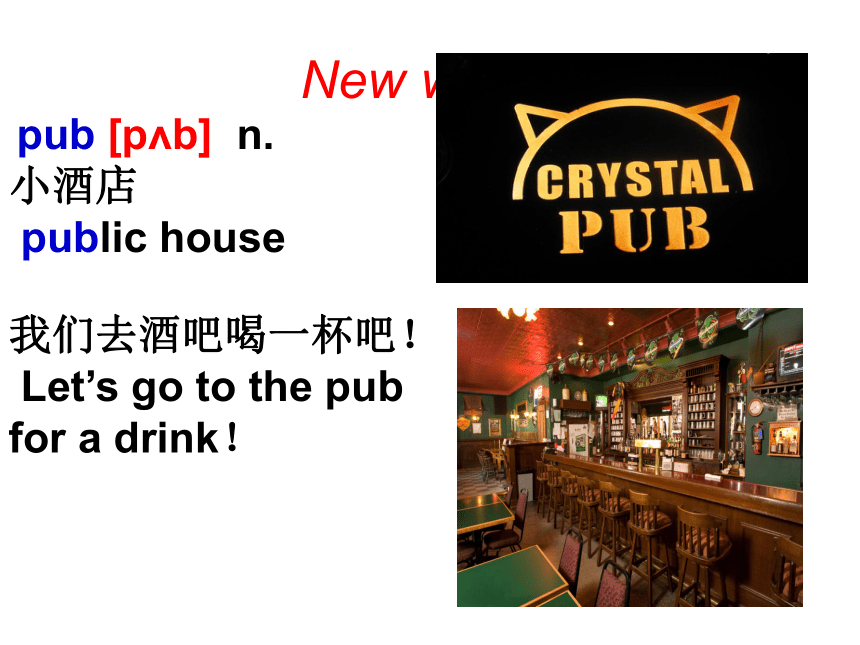
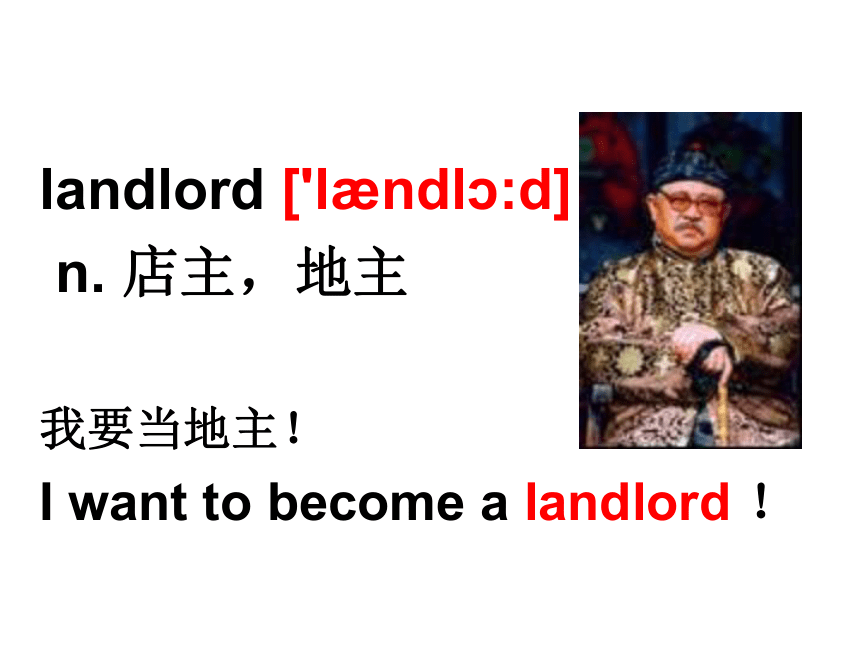
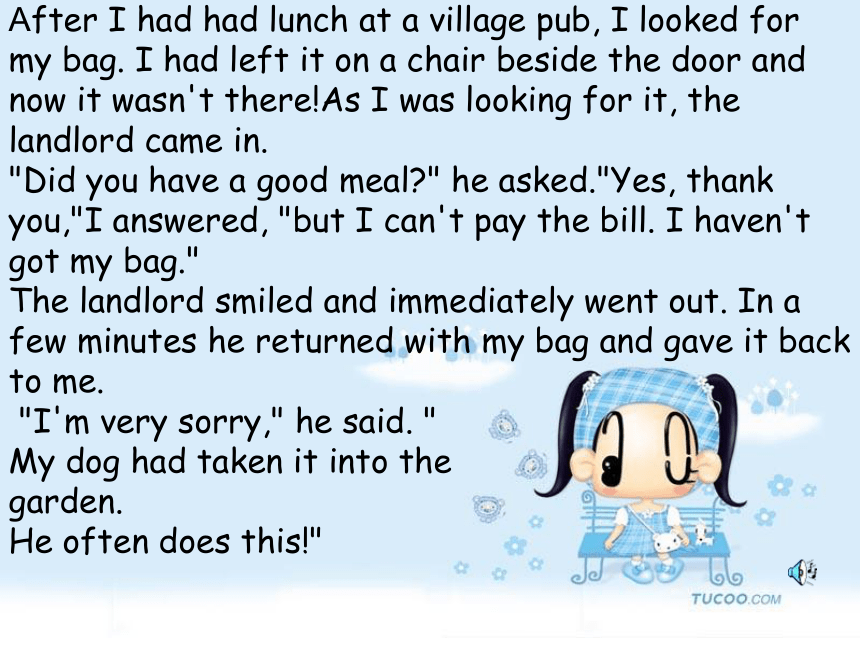
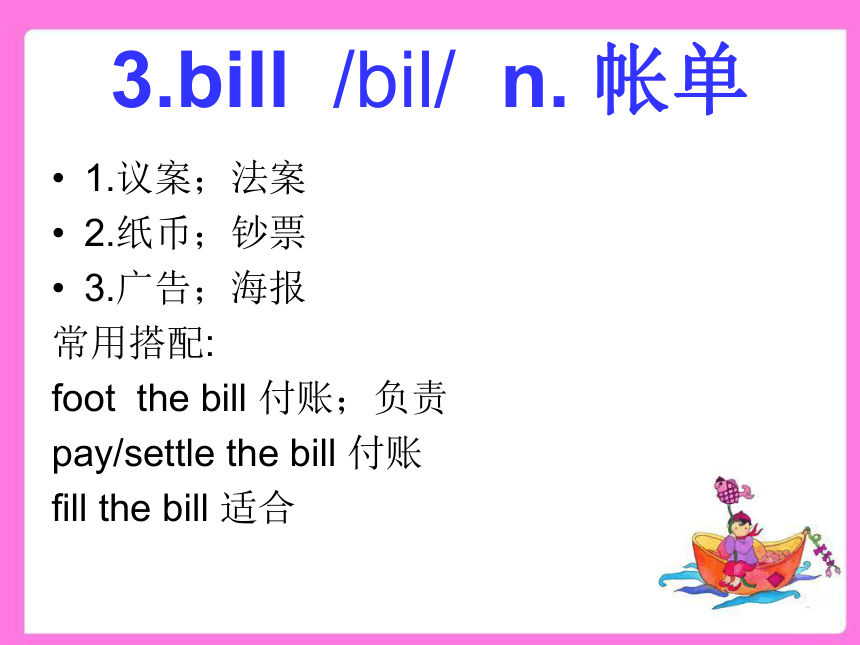
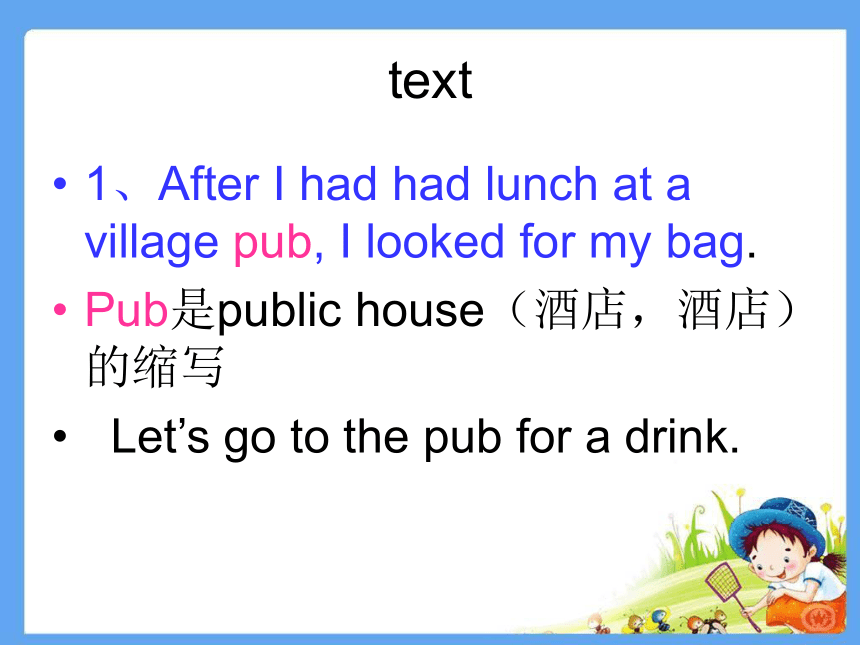
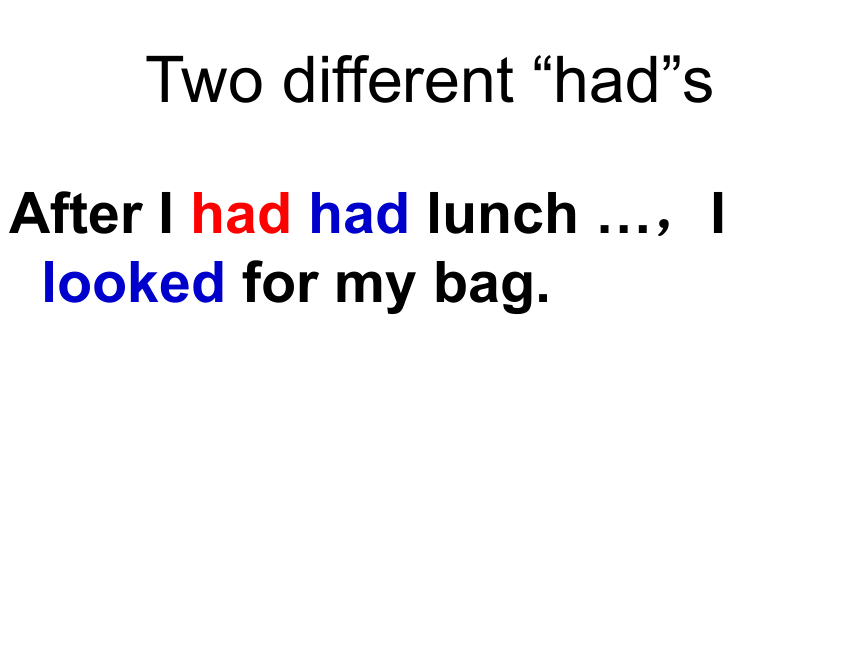
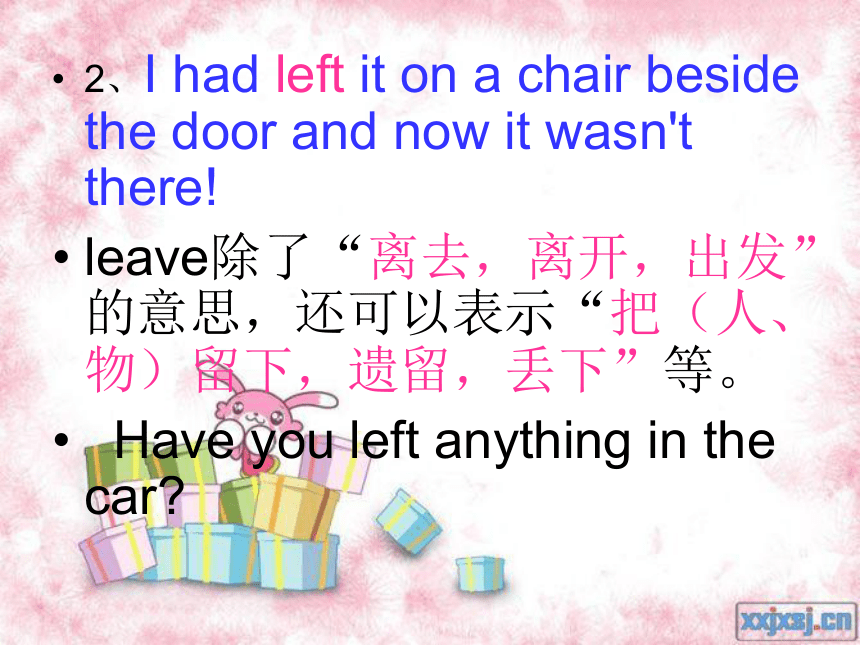
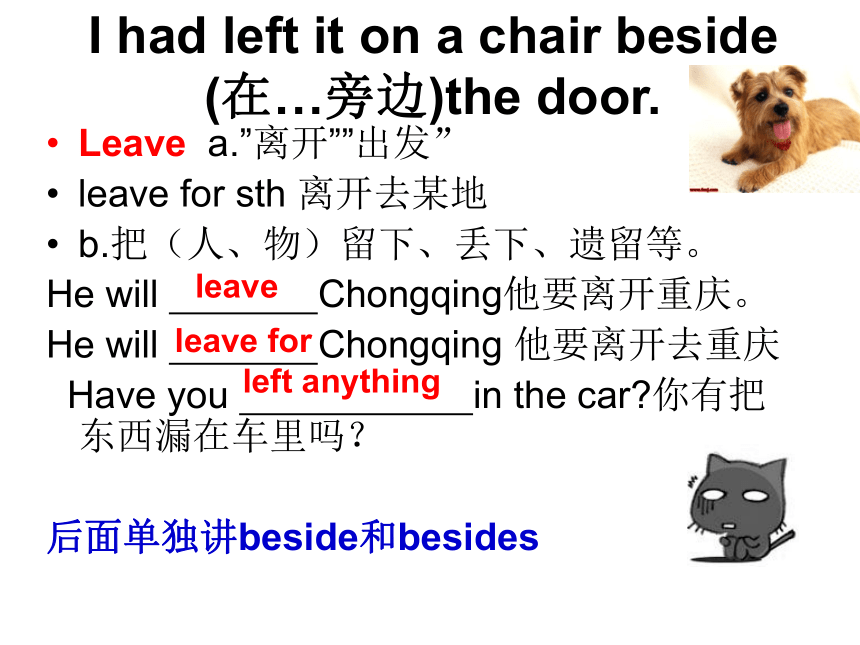
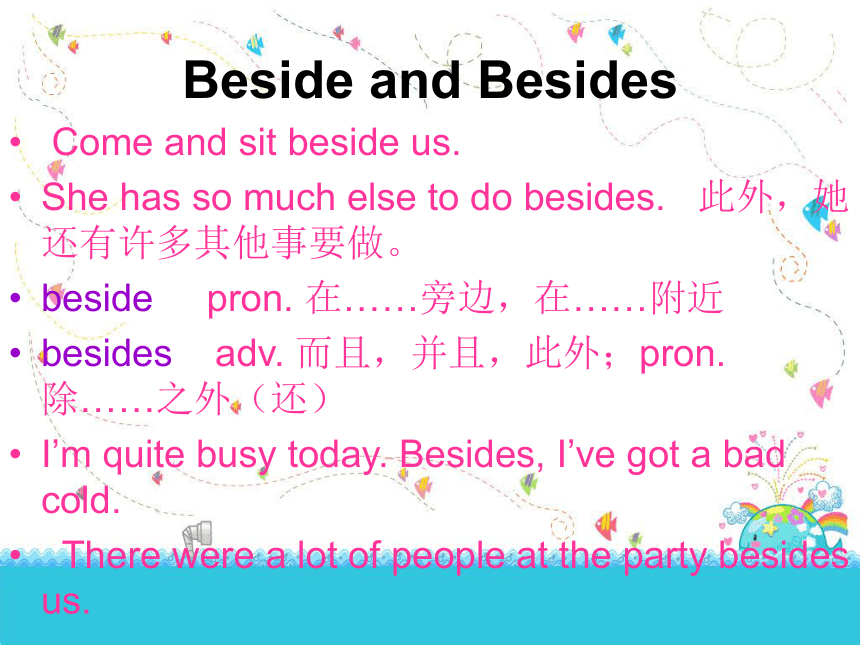
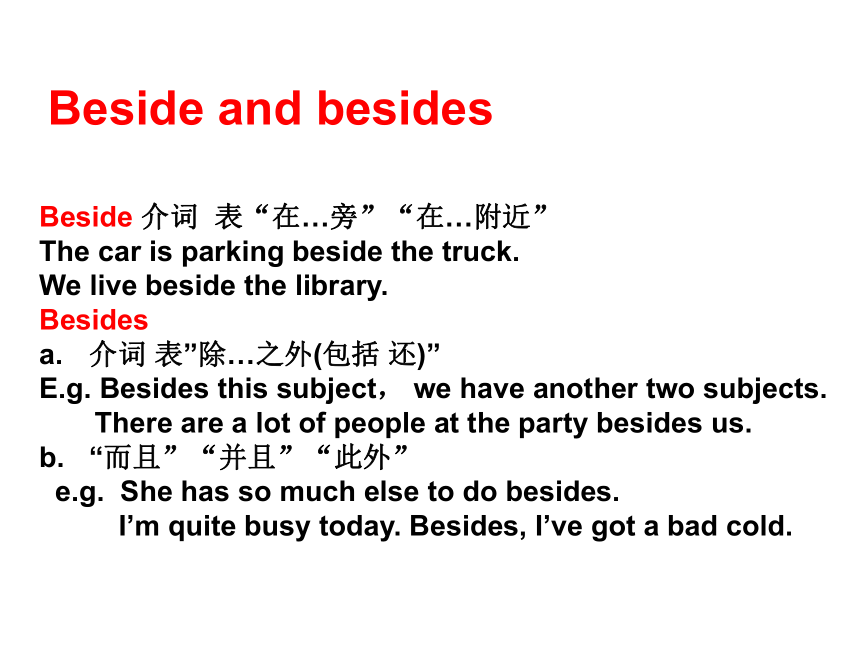
文档简介
(共31张PPT)
Lesson 18
He often does this!
【New words and expressions】
pub /p b/ n. 小酒店
landlord / ndl :d/ n. 店主
bill /bil/ n. 帐单
New words
pub [p b] n.
小酒店
public house
我们去酒吧喝一杯吧!
Let’s go to the pub
for a drink!
landlord ['l ndl :d]
n. 店主,地主
我要当地主!
I want to become a landlord !
After I had had lunch at a village pub, I looked for my bag. I had left it on a chair beside the door and now it wasn't there!As I was looking for it, the landlord came in.
"Did you have a good meal " he asked."Yes, thank you,"I answered, "but I can't pay the bill. I haven't got my bag."
The landlord smiled and immediately went out. In a few minutes he returned with my bag and gave it back to me.
"I'm very sorry," he said. "
My dog had taken it into the
garden.
He often does this!"
3.bill /bil/ n. 帐单
1.议案;法案
2.纸币;钞票
3.广告;海报
常用搭配:
foot the bill 付账;负责
pay/settle the bill 付账
fill the bill 适合
text
1、After I had had lunch at a village pub, I looked for my bag.
Pub是public house(酒店,酒店)的缩写
Let’s go to the pub for a drink.
Two different “had”s
After I had had lunch …,I looked for my bag.
2、I had left it on a chair beside the door and now it wasn't there!
leave除了“离去,离开,出发”的意思,还可以表示“把(人、物)留下,遗留,丢下”等。
Have you left anything in the car
I had left it on a chair beside (在…旁边)the door.
Leave a.”离开””出发”
leave for sth 离开去某地
b.把(人、物)留下、丢下、遗留等。
He will Chongqing他要离开重庆。
He will Chongqing 他要离开去重庆
Have you in the car 你有把东西漏在车里吗?
后面单独讲beside和besides
leave
leave for
left anything
Beside and Besides
Come and sit beside us.
She has so much else to do besides. 此外,她还有许多其他事要做。
beside pron. 在……旁边,在……附近
besides adv. 而且,并且,此外;pron. 除……之外(还)
I’m quite busy today. Besides, I’ve got a bad cold.
There were a lot of people at the party besides us.
Beside and besides
Beside 介词 表“在…旁”“在…附近”
The car is parking beside the truck.
We live beside the library.
Besides
介词 表”除…之外(包括 还)”
E.g. Besides this subject, we have another two subjects.
There are a lot of people at the party besides us.
“而且”“并且”“此外”
e.g. She has so much else to do besides.
I’m quite busy today. Besides, I’ve got a bad cold.
As I was looking for it, the landlord came in.
当我正在寻找时,酒店老板走了进来。
As…,… = While…, … 当…,…发生了
eg.:
昨晚当我睡着的时候,一只小偷进来了。
, a thief came in.
As I was sleeping
I looked for my bag。
Look for 寻找(强调找的过程)
Find找到,强调寻找的结果。
e.g.我在寻找一个快速致富的方法。
a way to
get rich quickly.
e.g.嘿,你在找茬吧。
Hey, .
Can you a football in our classroom
We are it.
I’m looking for
you’re looking for trouble
find
looking for
Did you have a good meal
Have a meal 吃饭。注:是用good修meal。
I haven’t got my bag. 我的包包没有了
= I didn’t have my bag
Immediately“立刻”“马上”
E.g. He went to bed immediately.
bill [bil] n. 账单,比尔
Bill will pay the bill for me.
比尔会替我买单的。
In a few minutes he returned with my bag and gave it back to me.
In a few minutes 不到几分钟的时间
In a few days
In a few weeks
In a few months
In a few years
give的几个固定搭配
1.give常用含义是“给予,交给”
I lent him some books last month and he has given them back to me this morning.
2.gave away 赠送
He gave away all his books to the library.
3.give in 上交,呈交;屈服,让步,投降
Give in your examination papers after you’ve finished.
You can do what you like. I will never give in.
4.give up doing sth. 放弃,抛弃
He gave up drinking a few years ago.
5.give up 交出,让出
Jack has given up the watch he stole last week.
Three of our officers gave themselves up to the enemy. 我方的三名军官向敌人投降了。
3、'I'm very sorry,' he said. 'My dog had taken in into the garden. He often does this!'
he指店主的狗,英语国家人士常用人称代词he或she指自己喂养的宠物。
He often does this.
He/she都可用来指Pets
此外She 指
nation, mountain, river, tower,building.
Have 的用法 (1)助动词,构成各种perfect tense(完成时)
Have you had lunch yet
你吃过午饭了吗?
When I rang, Tim had already left.
现在完成 Have/has + done.
e.g. I have already done my job .
E.g. 过去完成 Had+ done.
☆have作“具有,拥有”讲时是状态动词,不能用于进行时态或被动语态,通常用于一般现在时。在其它时态中,一般用have而不用have got。
You can have these apples if you want them. I’ve got a lot more.
如果你想要这些苹果你可以把它们拿走。我还有许多。
He must be very fond of animals to have five dogs. 他一定非常喜欢动物,才会养五条狗.
Have 的用法 (2)实义动词。拥有 have=have got
=own,possess 拥有
He owns a farm = He possess a farm =He has a farm =He has got a farm
我有一双小眼睛。
I have got a pair of small eyes.
Attention!
表示“生病”
不能用own,possess!!
I have a stomachache
=I have got a stomachache
have 还可以表示Receive. Have a letter from sb.
Have 的用法 (2)得病 have=have got
have的用法
在下面哪几句话中可用have got来代替have
1 He had a drink before dinner. ⑴...不换...
2 Mrs. Sullivan has a lot of money. ⑵...换... 有钱
3 He had to leave early. ⑶...换...
4 We have had a long conversation. ⑷...不换... 进行
5 My mother has a headache. ⑸...换... 患病
6 They had a good time at the party. ⑹...不换...
have a good/long time : 过的愉快(固定短语)
3、have作动词时,还可以表示eat,drink,enjoy,take等意思,这时它是行为动词,可以用于包括进行时的各种时态。当have用于表示这些含义时,它必须与助动词do等连用以构成疑问句或否定句。
have dinner,have a cigarette,have coffee,have a holiday,have a good time,have a swim,have a rest
Have 的用法 (3)固定短语
Have a bath/ drink/ look/ conversation……(take)
洗个澡、喝一杯、看一下、聊一会、、
Have a good time
=enjoy oneself 玩得开心
(4)Have to 不得不
Eg.:我不得不努力长胖
I have to grow fat, because I want to be a sumo/su:mo/相扑
have to
= have got to
summary
现在完成时 “have + 过去分词”
过去完成时 “had + 过去分词”
拥有 have = have got = own = possess
得病 have = have got headache / fever /cough
固定短语 a.have dinner / lunch / breakfast
b.have a good time
c. Have a bath/ drink/ look/ conversation…
4. have to =have got to不得不
I don’t have a pen/a headache.
I haven’t a pen /a headache.
三种情况have 可用 have got取代
I have a pen.= I have got a pen. “有”
I have a headache. “得病”
have to== have got to
Thank you!
Lesson 18
He often does this!
【New words and expressions】
pub /p b/ n. 小酒店
landlord / ndl :d/ n. 店主
bill /bil/ n. 帐单
New words
pub [p b] n.
小酒店
public house
我们去酒吧喝一杯吧!
Let’s go to the pub
for a drink!
landlord ['l ndl :d]
n. 店主,地主
我要当地主!
I want to become a landlord !
After I had had lunch at a village pub, I looked for my bag. I had left it on a chair beside the door and now it wasn't there!As I was looking for it, the landlord came in.
"Did you have a good meal " he asked."Yes, thank you,"I answered, "but I can't pay the bill. I haven't got my bag."
The landlord smiled and immediately went out. In a few minutes he returned with my bag and gave it back to me.
"I'm very sorry," he said. "
My dog had taken it into the
garden.
He often does this!"
3.bill /bil/ n. 帐单
1.议案;法案
2.纸币;钞票
3.广告;海报
常用搭配:
foot the bill 付账;负责
pay/settle the bill 付账
fill the bill 适合
text
1、After I had had lunch at a village pub, I looked for my bag.
Pub是public house(酒店,酒店)的缩写
Let’s go to the pub for a drink.
Two different “had”s
After I had had lunch …,I looked for my bag.
2、I had left it on a chair beside the door and now it wasn't there!
leave除了“离去,离开,出发”的意思,还可以表示“把(人、物)留下,遗留,丢下”等。
Have you left anything in the car
I had left it on a chair beside (在…旁边)the door.
Leave a.”离开””出发”
leave for sth 离开去某地
b.把(人、物)留下、丢下、遗留等。
He will Chongqing他要离开重庆。
He will Chongqing 他要离开去重庆
Have you in the car 你有把东西漏在车里吗?
后面单独讲beside和besides
leave
leave for
left anything
Beside and Besides
Come and sit beside us.
She has so much else to do besides. 此外,她还有许多其他事要做。
beside pron. 在……旁边,在……附近
besides adv. 而且,并且,此外;pron. 除……之外(还)
I’m quite busy today. Besides, I’ve got a bad cold.
There were a lot of people at the party besides us.
Beside and besides
Beside 介词 表“在…旁”“在…附近”
The car is parking beside the truck.
We live beside the library.
Besides
介词 表”除…之外(包括 还)”
E.g. Besides this subject, we have another two subjects.
There are a lot of people at the party besides us.
“而且”“并且”“此外”
e.g. She has so much else to do besides.
I’m quite busy today. Besides, I’ve got a bad cold.
As I was looking for it, the landlord came in.
当我正在寻找时,酒店老板走了进来。
As…,… = While…, … 当…,…发生了
eg.:
昨晚当我睡着的时候,一只小偷进来了。
, a thief came in.
As I was sleeping
I looked for my bag。
Look for 寻找(强调找的过程)
Find找到,强调寻找的结果。
e.g.我在寻找一个快速致富的方法。
a way to
get rich quickly.
e.g.嘿,你在找茬吧。
Hey, .
Can you a football in our classroom
We are it.
I’m looking for
you’re looking for trouble
find
looking for
Did you have a good meal
Have a meal 吃饭。注:是用good修meal。
I haven’t got my bag. 我的包包没有了
= I didn’t have my bag
Immediately“立刻”“马上”
E.g. He went to bed immediately.
bill [bil] n. 账单,比尔
Bill will pay the bill for me.
比尔会替我买单的。
In a few minutes he returned with my bag and gave it back to me.
In a few minutes 不到几分钟的时间
In a few days
In a few weeks
In a few months
In a few years
give的几个固定搭配
1.give常用含义是“给予,交给”
I lent him some books last month and he has given them back to me this morning.
2.gave away 赠送
He gave away all his books to the library.
3.give in 上交,呈交;屈服,让步,投降
Give in your examination papers after you’ve finished.
You can do what you like. I will never give in.
4.give up doing sth. 放弃,抛弃
He gave up drinking a few years ago.
5.give up 交出,让出
Jack has given up the watch he stole last week.
Three of our officers gave themselves up to the enemy. 我方的三名军官向敌人投降了。
3、'I'm very sorry,' he said. 'My dog had taken in into the garden. He often does this!'
he指店主的狗,英语国家人士常用人称代词he或she指自己喂养的宠物。
He often does this.
He/she都可用来指Pets
此外She 指
nation, mountain, river, tower,building.
Have 的用法 (1)助动词,构成各种perfect tense(完成时)
Have you had lunch yet
你吃过午饭了吗?
When I rang, Tim had already left.
现在完成 Have/has + done.
e.g. I have already done my job .
E.g. 过去完成 Had+ done.
☆have作“具有,拥有”讲时是状态动词,不能用于进行时态或被动语态,通常用于一般现在时。在其它时态中,一般用have而不用have got。
You can have these apples if you want them. I’ve got a lot more.
如果你想要这些苹果你可以把它们拿走。我还有许多。
He must be very fond of animals to have five dogs. 他一定非常喜欢动物,才会养五条狗.
Have 的用法 (2)实义动词。拥有 have=have got
=own,possess 拥有
He owns a farm = He possess a farm =He has a farm =He has got a farm
我有一双小眼睛。
I have got a pair of small eyes.
Attention!
表示“生病”
不能用own,possess!!
I have a stomachache
=I have got a stomachache
have 还可以表示Receive. Have a letter from sb.
Have 的用法 (2)得病 have=have got
have的用法
在下面哪几句话中可用have got来代替have
1 He had a drink before dinner. ⑴...不换...
2 Mrs. Sullivan has a lot of money. ⑵...换... 有钱
3 He had to leave early. ⑶...换...
4 We have had a long conversation. ⑷...不换... 进行
5 My mother has a headache. ⑸...换... 患病
6 They had a good time at the party. ⑹...不换...
have a good/long time : 过的愉快(固定短语)
3、have作动词时,还可以表示eat,drink,enjoy,take等意思,这时它是行为动词,可以用于包括进行时的各种时态。当have用于表示这些含义时,它必须与助动词do等连用以构成疑问句或否定句。
have dinner,have a cigarette,have coffee,have a holiday,have a good time,have a swim,have a rest
Have 的用法 (3)固定短语
Have a bath/ drink/ look/ conversation……(take)
洗个澡、喝一杯、看一下、聊一会、、
Have a good time
=enjoy oneself 玩得开心
(4)Have to 不得不
Eg.:我不得不努力长胖
I have to grow fat, because I want to be a sumo/su:mo/相扑
have to
= have got to
summary
现在完成时 “have + 过去分词”
过去完成时 “had + 过去分词”
拥有 have = have got = own = possess
得病 have = have got headache / fever /cough
固定短语 a.have dinner / lunch / breakfast
b.have a good time
c. Have a bath/ drink/ look/ conversation…
4. have to =have got to不得不
I don’t have a pen/a headache.
I haven’t a pen /a headache.
三种情况have 可用 have got取代
I have a pen.= I have got a pen. “有”
I have a headache. “得病”
have to== have got to
Thank you!
同课章节目录
